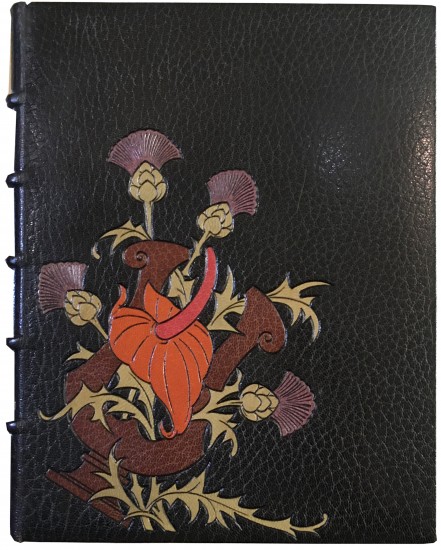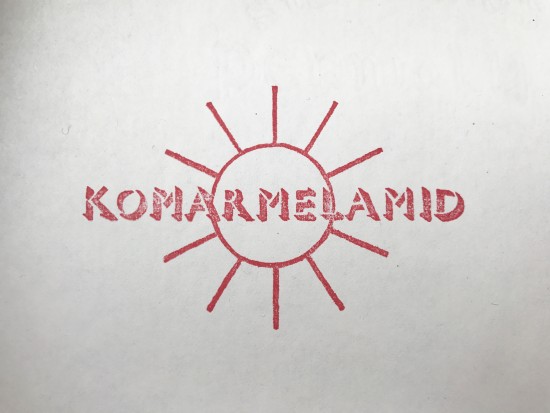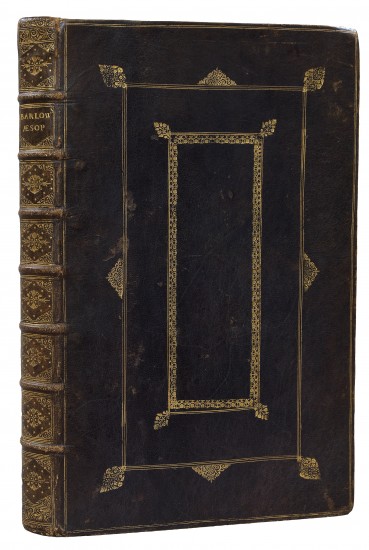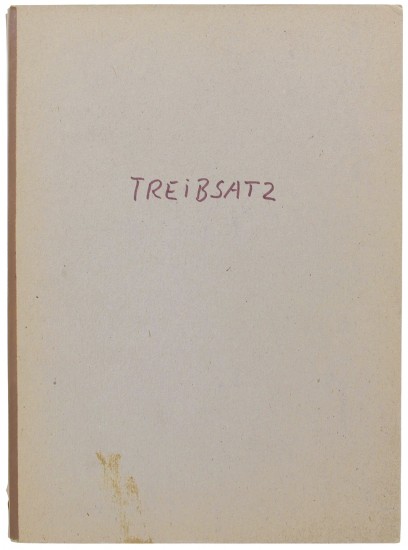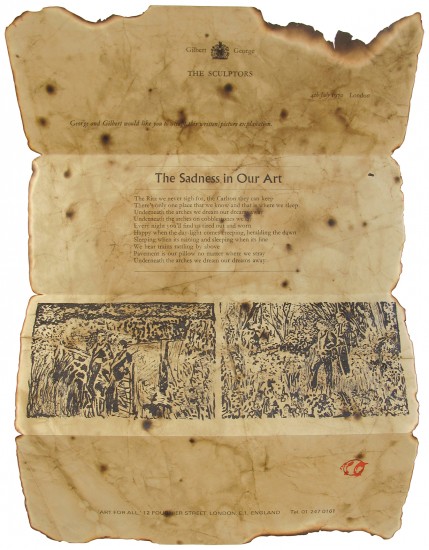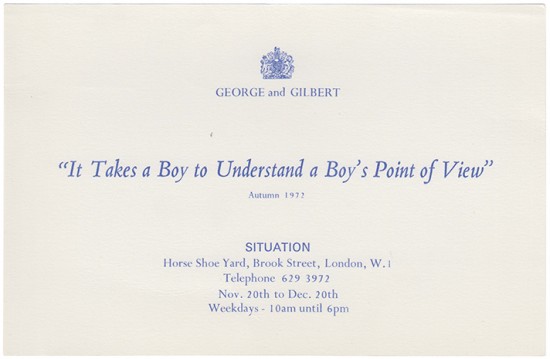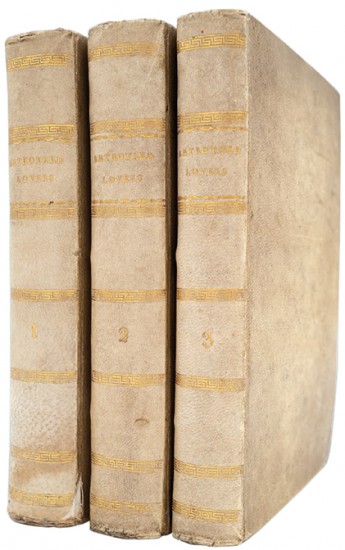CABARET VOLTAIRE. Recueil Littéraire et Artistique
.
Zurich. 1916
Sold
The first publication of the dada movement - unique issue limited to 500 copies - and the first appearance of the word dada in print.
This unique issue of Cabaret Voltaire takes its name from the Zurich pub run by a retired Dutch sailor which was taken over by Hugo Ball (the magazine's editor) and transformed into a cabaret-cum-nightclub with the help of Emmy Hennings, whom Ball later married. They were soon joined by Tzara, Janco, Huelsenbeck and Arp. True expression - occasionally of an artistic nature - for the Voltaire group meant nightly performances of Negro chanting, impassioned readings of Futurist manifestoes, recitals of simultaneous verse, Huelsenbeck drumming, and the singing of Russian folksongs.
A review of some kind was soon under discussion, which Tzara wanted to call dada, but when it eventually appeared it bore the name of its incubator, Cabaret Voltaire; by the time the magazine appeared, the group had abandoned the Cabaret due to Ball's departure.
The contents of the magazine are still transitional in tone, with dada mentioned only inside, though it was Ball's editorial boast that this was 'the first synthesis of the modern schools of art'. In the same editorial Ball elaborates on the Cabaret's history and the derivation of the word dada, while the contributors which follow are distinguished, Ball proudly notes, by having nothing to do with the hated 'German mentality'. These contributors include members of the international avant-garde network which Tzara was in correspondence with: Apollinaire, Modigliani (a pencil drawing of Arp), Kandinsky (two poems), the Futurists Cangiullo and Marinetti (freeword poems), Otto van Rees, together with the Cabaret band themselves, including a 'poème simultan par R. Huelsenbeck, M. Janko, Tr. Tzara' accompanied by Tzara's amusing 'notes for the bourgeoisie' on its evolution and mode of reading. The magazine also contains the catalogue of the permanent exhibition on view at the Cabaret.
'Lorsque je fondis le Cabaret Voltaire, j'étais convaincu qu'il y aurait en Suisse quelques jeunes hommes qui voudraient comme moi, non seulement jouir de leur indépendance, mais aussi la prouver ... L'intention des artistes assemblés ici est de publier une revue internationale. La revue paraîtra à Zurich et protera le nom DADA Dada Dada Dada Dada.' (Hugo Ball's introduction to Cabaret Voltaire, dated 'Zurich, le 15 mai 1916').
'Dada is 'yes, yes', in Rumanian, 'rocking-horse' in French. For Germans it is a sign of foolish naïveté, joy in procreation, and preoccupation with the baby carriage.' (Hugo Ball, March 1916).
[Ades 3:39; not in Destribats]
This unique issue of Cabaret Voltaire takes its name from the Zurich pub run by a retired Dutch sailor which was taken over by Hugo Ball (the magazine's editor) and transformed into a cabaret-cum-nightclub with the help of Emmy Hennings, whom Ball later married. They were soon joined by Tzara, Janco, Huelsenbeck and Arp. True expression - occasionally of an artistic nature - for the Voltaire group meant nightly performances of Negro chanting, impassioned readings of Futurist manifestoes, recitals of simultaneous verse, Huelsenbeck drumming, and the singing of Russian folksongs.
A review of some kind was soon under discussion, which Tzara wanted to call dada, but when it eventually appeared it bore the name of its incubator, Cabaret Voltaire; by the time the magazine appeared, the group had abandoned the Cabaret due to Ball's departure.
The contents of the magazine are still transitional in tone, with dada mentioned only inside, though it was Ball's editorial boast that this was 'the first synthesis of the modern schools of art'. In the same editorial Ball elaborates on the Cabaret's history and the derivation of the word dada, while the contributors which follow are distinguished, Ball proudly notes, by having nothing to do with the hated 'German mentality'. These contributors include members of the international avant-garde network which Tzara was in correspondence with: Apollinaire, Modigliani (a pencil drawing of Arp), Kandinsky (two poems), the Futurists Cangiullo and Marinetti (freeword poems), Otto van Rees, together with the Cabaret band themselves, including a 'poème simultan par R. Huelsenbeck, M. Janko, Tr. Tzara' accompanied by Tzara's amusing 'notes for the bourgeoisie' on its evolution and mode of reading. The magazine also contains the catalogue of the permanent exhibition on view at the Cabaret.
'Lorsque je fondis le Cabaret Voltaire, j'étais convaincu qu'il y aurait en Suisse quelques jeunes hommes qui voudraient comme moi, non seulement jouir de leur indépendance, mais aussi la prouver ... L'intention des artistes assemblés ici est de publier une revue internationale. La revue paraîtra à Zurich et protera le nom DADA Dada Dada Dada Dada.' (Hugo Ball's introduction to Cabaret Voltaire, dated 'Zurich, le 15 mai 1916').
'Dada is 'yes, yes', in Rumanian, 'rocking-horse' in French. For Germans it is a sign of foolish naïveté, joy in procreation, and preoccupation with the baby carriage.' (Hugo Ball, March 1916).
[Ades 3:39; not in Destribats]
[16 numbered leaves on glossy paper]. pp. 32, justification printed on rear inside wrapper. 4to. (270 x 222 mm). Illustrated throughout with monochrome illustrations by various artists Original scarlet paper stapled wrappers, printed title in black to upper cover and Arp drawing printed in black on appliqué section of gold paper.
#41217


